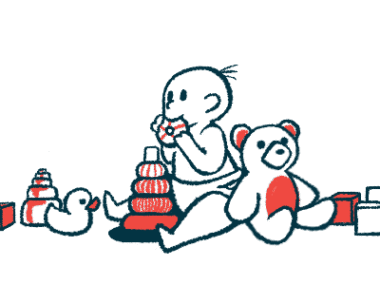Trial Data Show STK-001 Safe, Likely Effective at Reducing Seizures
Written by |

Stoke Therapeutics’ investigational therapy STK-001 is generally safe and results in a trend toward a reduction in seizure frequency in children and adolescents with Dravet syndrome, according to interim data from the ongoing Phase 1/2a MONARCH trial.
These promising early findings, concerning STK-001’s single doses up to 30 mg and multiple doses at 20 mg, supported a decision from the U.S. Food and Drug Administration (FDA) allowing the evaluation of an additional higher dose — 45 mg — in the trial (NCT04442295).
“The recent positive interim data from the Phase 1/2a MONARCH study in patients with Dravet syndrome continue to support our efforts to develop STK-001 as the first potential new medicine to target the underlying cause of this severe and progressive genetic epilepsy,” Edward M. Kaye, MD, Stoke’s CEO, said in a press release.
The company’s chief medical officer, Barry Ticho, MD, PhD, noted in a separate press release that Dravet is “difficult to treat.”
“Despite available anti-seizure medicines, seizures are not adequately controlled for more than 90% of [Dravet] patients, contributing to poor quality of life,” Ticho said.
“Although based on an open-label study of a small number of patients, we saw an early trend toward a reduction in convulsive seizure frequency, which is remarkable considering the amount of [simultaneous] medicines used and the relatively low single dose levels of STK-001 evaluated,” he said.
MONARCH’s additional interim data were submitted for presentation at the American Epilepsy Society 2021 Annual Meeting, scheduled for Dec. 3–7, in Chicago. This year’s meeting can be attended in person or virtually.
Both MONARCH and its parallel Phase 1/2a trial in the U.K., called ADMIRAL, are actively enrolling Dravet patients, ages 2 to 18, to receive multiple doses of STK-001 at 30 mg — a dose that, similar to 45 mg, was first put on a partial hold by the FDA. More information on U.S. contacts and locations can be found here.
Stoke expects to share preliminary data from the trials in the second half of 2022.
“We look forward to continuing our two ongoing studies as we work to identify a dose level that has the potential to maximize efficacy while minimizing treatment frequency for patients with Dravet syndrome,” Ticho said.
STK-001 works by increasing the production of NaV1.1, a sub-unit of a sodium channel protein responsible for the transmission of electrical signals in the brain. The protein’s production is impaired in most Dravet patients due to mutations in one of the two copies of each individual’s SCN1A gene.
By restoring NaV1.1 levels, the therapy is expected to reduce seizure frequency, as well as ease other symptoms associated with Dravet. STK-001 is injected directly into the spinal canal that contains the cerebrospinal fluid (CSF), the liquid that surrounds the brain and spinal cord.
The therapy received orphan drug designation from the FDA for Dravet — a designation meant to accelerate its clinical development and regulatory review.
The two parallel, open-label trials, MONARCH and ADMIRAL, are evaluating STK-001’s safety, tolerability, pharmacokinetics, and preliminary efficacy in children and adolescents with Dravet syndrome who carry SCN1A mutations.
Pharmacokinetics refers to the therapy’s movement into, through, and out of the body. Efficacy measures include changes in seizure frequency, clinical status, and quality of life.
Up to 90 patients will be recruited at 18 locations across the U.S., and up to 60 patients at U.K. sites. Eligible participants must be on a stable dose of anti-seizure treatment and have received at least two prior anti-seizure medications that were discontinued due to ineffectiveness or side effects.
While MONARCH is testing both single and multiple doses of STK-001, now up to 45 mg, the ADMIRAL study is evaluating multiple doses only, up to 70 mg. Participants will be followed for six months after the last dose.
The newly announced interim results from MONARCH concern 15 patients given a single injection of STK-001 (10, 20, or 30 mg), who were followed for at least three months, and six patients who received multiple 20 mg injections (most often three injections one month apart).
In these participants, all doses were generally well-tolerated, with no STK-001-related serious adverse events and no treatment discontinuations reported. Common adverse events (side effects) included headache, irritability, vomiting, seizure, and back pain.
Three patients (14%), all of whom received a single injection at either 10 or 20 mg, experienced adverse events that were deemed related to the therapy.
There was a dose-dependent increase in STK-001 levels both in blood and CSF, and such levels were measurable in the CSF for up to six months following a single injection — “indicating sustained exposure of STK-001 in the brain,” Stoke stated in the release.
In addition, pharmacokinetic data were consistent with model predictions derived from preclinical studies, and suggest that 95% of patients will have therapeutic levels of STK-001 in their brains after three monthly 30 mg injections.
Of note, estimated therapeutic levels are defined as those that could result in a twofold increase of Nav1.1, which is believed to restore normal levels in a patient’s brain cells. Half of all patients are anticipated to remain at therapeutic levels for about three months after the last dose.
“The initial positive safety data from MONARCH are highly encouraging and we now have greater clarity on the dose levels that are likely to be pharmacologically active in patients,” Ticho said.
Moreover, available data from 11 patients given a single injection of STK-001 showed a reduction in seizure rate in eight of them (72.7%).
Notably, MONARCH participants had a median of 17 convulsive seizures in the four-week screening period prior to receiving STK-001, highlighting their high seizure burden. This was despite the fact that 85% were on three or more simultaneous anti-seizure medicines. Among the medications taken by patients were clobazam and fenfluramine.
At the time of the analysis, all participants given a single dose of STK-001 chose to enter the open-label extension SWALLOWTAIL study (NCT04740476), in which they will receive up to three injections (one every four months) at the same dose level as in MONARCH.






